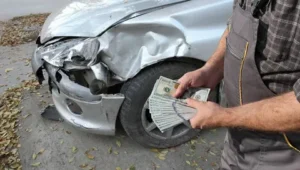It’s not easy to handle a vehicle that has been severely damaged, regardless of whether it was the result of an accident or a natural catastrophe. It could appear that you’re at the end if the insurance company tells you that your vehicle is a “total loss.” Even a car that is destroyed still has worth, though. The first step in making the finest financial option during a hard time is to know how much my car is worth as a salvage.
This guide will teach you all you need to know. We’ll talk about what a salvage vehicle is, how its value is set, and what you may do after your automobile has been written off. You will also learn a basic formula for salvage value and how to receive an instant value for your car online in just a few minutes.
What is a Salvage Vehicle?
A salvage car is a vehicle that an insurance company has classified as a “total loss.” This is usually the case when the repair cost for the vehicle is more than a certain amount of its market value pre-damage. This amount, referred to as the threshold for total loss, differs by state and insurance company but usually ranges between 70% and 90 percent of the vehicle’s cash value. When a vehicle is declared a salvage car, then the State’s Department of Motor Vehicles (DMV) issues it with a “salvage title.” The title will be permanently branded on the vehicle, which indicates the car has suffered serious damage. It is important to differentiate the difference between a salvage car and one that is a “junk” or “rebuilt” vehicle:
- Junk Car: A vehicle in which the road is closed, and is often sold to buyers looking for scrap metal or components. It is not legal to drive again.
- Rebuilt Car: This is a salvage car that has been fixed and passed a state-approved inspection. It is issued a “rebuilt title” and can be legally driven; however, its past of being a vehicle used for salvage is in the public record, which greatly influences its resale worth.
How Does a Car Become a Salvage Vehicle?
Many factors could cause an automobile to be classified as a salvage vehicle. If you are ever in the same situation , knowing these things can aid you in knowing what you can expect. Car accidents: Almost every time, vehicles get destroyed because they crashed into something. Head-on collisions with T-bones and rollovers are instances of very serious accidents that cause many mechanical and structural damages that are expensive to repair.
- Natural Disasters such as hurricanes, floods, and tornadoes can all ruin or damage a large number of vehicles at one time. Floodwater damage can be done to a vehicle’s engines, electrical systems, and even the interior to such a degree that repairs aren’t likely.
- Other Incidents: Cars can be damaged when just one vehicle is involved, such as when you crash into the guardrail or a tree. If you’re hit by an uninsured motorist It is crucial to understand the value of your vehicle as a salvage vehicle since you might have to decide between selling it to a buyer or paying for costly repairs yourself.
How to Calculate the Salvage Value of My Car
Insurance companies utilize a very consistent way to figure out how much a car is worth as salvage. You can get a quick estimate with a vehicle salvage value calculator, but knowing the formula will help you understand where the number comes from.
Step 1: Determine the Actual Cash Value (ACV)
In the beginning, you must determine the market value of your vehicle prior to the incident. This is referred to as actual cash value (ACV). It is possible to use reliable sources such as the salvage valuation blue book (Kelley Blue Book – KBB) or NADA guides to obtain an accurate estimation. Your ACV will be based on the year, model, year of manufacture, and mileage, as well as the condition and the options.
Step 2: Understand the Insurer’s Threshold
Next, figure out how much your insurance company will pay if you lose everything. The cost of repairs must be more than this percentage of the ACV for the car to be considered totaled. Most insurance companies have a limit of roughly 75%, however this could vary.
Step 3: Apply the Salvage Value Formula
Once you have the ACV, you can use a simple formula to estimate the salvage value. The most common calculation is:
Actual Cash Value (ACV) minus the Cost of Repairs equals the Salvage Value.
But insurance firms generally use a simple percentage-based method to figure things out. They figure up the salvage value as a percentage of the ACV, which is how much they think they will get back by selling the automobile at a salvage auction.
Here’s an easy way to estimate it:
ACV x (1 – Insurer’s Damage Threshold %) = Estimated Salvage Value
Let’s take a look at an obvious example:
Your car’s ACV is $15,000.
If you are unable to recover all of your possessions, the insurance company will reimburse you 75% of the amount it costs.
- The car won’t be worth fixing if the repair costs over $11,250 ($15,000 divided by 0.75).
- Salvage value is typically the final part of the threshold (100 75% – 75% = 25 percent). This is the amount that the insurance company will use for the ACV.
- To determine the value of salvage, multiply the amount of $15,000 times 0.25. This will give you $3,750.
- The insurance company claims that your car may be sold for $3,750.
Your Options: What to Do with a Salvage Vehicle
After your car is declared a total loss, you generally have two main choices.
Option 1: Let the Insurance Company Take It
This is the most common and simplest path. The insurance company pays you a settlement check for the car’s ACV, minus your deductible. After that, they own the vehicle and sell it at a salvage auction to get back the salvage value. You get a cheque and don’t have to worry about what happens to the car.
Option 2: Keep the Car
In some situations, keep the damaged car. This is known as “owner retention.” People choose this option if they:
- Believe they can sell the car for parts or to a private buyer for more than the insurer’s calculated salvage value.
- Have the skills and resources to repair the car themselves.
- Want to use parts from the car for another vehicle.
If you decide to keep the car, your insurance payout will be the ACV, minus your deductible, and minus the salvage value. Using our earlier example, your payout would be $15,000 – (deductible) – $3,750. You would then be responsible for selling or repairing the vehicle yourself. If you repair it, you must go through a state inspection process to get a “rebuilt title” before you can drive it legally.
The Easiest Way to Sell: Get an Instant Online Offer
If you’re wondering what the salvage value of my car is online without the guesswork, there’s a simpler solution. Whether you’re dealing with an insurance company or are uninsured, getting a fast, guaranteed offer can empower you to make an informed decision.
At Junk Cars for Cash, we provide the easiest way to determine the salvage value of your car and turn it into cash.
Here’s why it’s the best option:
- Get a Guaranteed Quote in Minutes: Our online form is quick and easy. You’ll receive a no-obligation, guaranteed offer in about two minutes.
- Avoid the Hassle: You don’t have to deal with complex auctions, unreliable private buyers, or the lengthy process of getting a rebuilt title.
- We Buy Cars in Any Condition: It doesn’t matter if your car is running or not. We see the value in every vehicle.
- Free Towing and Fast Payment: We’ll schedule a free pickup at your convenience and deliver your payment on the spot.
Getting an instant offer helps you know exactly what your salvage car is worth, giving you leverage when negotiating with your insurance company or a straightforward way to get cash fast.
Make the Best Choice for Your Car
It can be hard to get your car labeled a salvage vehicle, but it doesn’t have to cost you money. You may take charge of the situation by learning what a salvage vehicle is, how to use the salvage value calculation, and what your alternatives are. Knowing how much your automobile is really worth gives you the power to make the best decision for your pocketbook.
Ready to find out what your car is worth? Get your free, instant offer from junkcarsforcash.co now and turn your salvage car into cash today!





